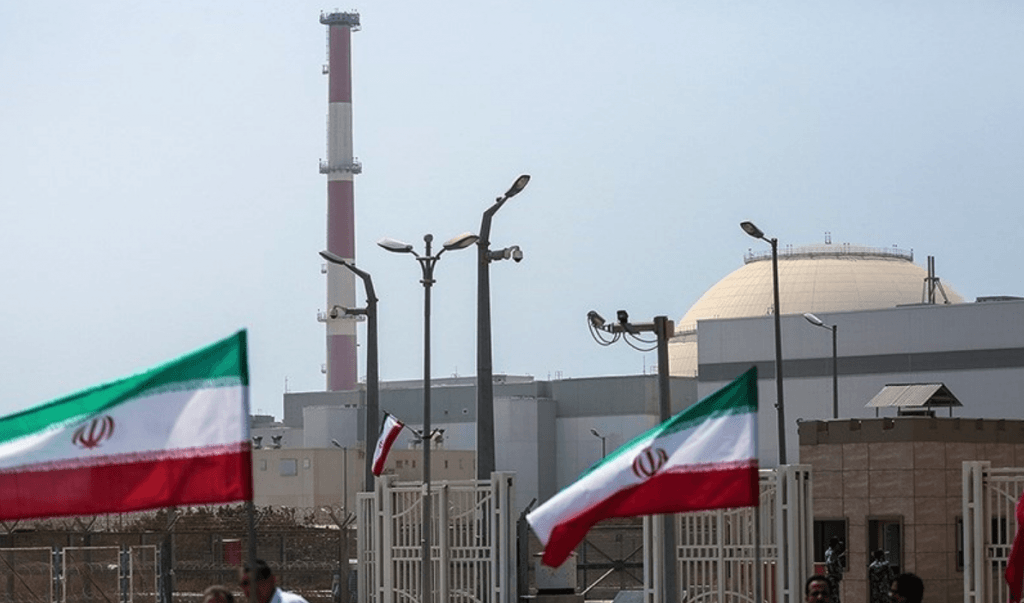Can the Iran nuclear deal survive as the IAEA investigates Israeli allegations?
By Emma Scott, Ian J. Stewart | April 8, 2019
 A nuclear power plant in Iran. Photo: Tasnim News Agency via Wikimedia Commons. CC BY 4.0. Cropped.
A nuclear power plant in Iran. Photo: Tasnim News Agency via Wikimedia Commons. CC BY 4.0. Cropped.
Since last spring when Israeli Prime Minister Benjamin Netanyahu announced that his country had seized secret Iranian nuclear files, including hundreds of documents, CDs and other media, from an undisclosed warehouse in early 2018, Israeli and US officials have pushed for the International Atomic Energy Agency (IAEA) to take action. News emerged in early April that it had done so.
Officials in Israel and to some extent the United States maintain that holding such an archive violates the Iranian nuclear deal of 2015 that offered sanctions relief to Iran in return for the country dismantling some of its nuclear capabilities. To date the agency hasn’t publicly commented on the material, but it is known that Israel has shared some or all of it with officials there. Scholars at Harvard University’s Belfer Center and researchers at the Institute for Science and International Security also have had limited access to the trove, but it’s not clear how much. Some nuclear proliferation experts believe that the archive contains nothing new about Iran’s past proliferation activities.
Missing from this debate is an understanding of the IAEA’s mandate in Iran, the environment in which the agency reviews alleged evidence, and the way the agency makes decisions about visiting relevant sites. In order for the IAEA to develop a so-called “broader conclusion” that all nuclear material in Iran remains in peaceful activities, officials are investigating Israel’s materials and conducting the necessary site visits. Given the skepticism with which many view the nature of Iran’s nuclear objectives, it looks increasingly untenable that the IAEA could reach a broader conclusion seen as credible by all. This has profound implications for the future of the nuclear accord with Iran. Absent a credible broader conclusion, it’s hard to imagine that in four years the parties to the accord would allow its automatic easing of nuclear restrictions to proceed.
The agency’s mandate. The IAEA is often referred to as the nuclear watchdog because it holds a mandate to monitor nuclear programs in nearly all countries worldwide. All states that adhere to the Non-Proliferation Treaty are required to submit a declaration to the IAEA, providing a starting point for the agency’s work. On top of that declaration, a so-called “Additional Protocol” that states enter into with the agency gives the IAEA the right to receive trade information, to use environmental sampling, and to access additional facilities. Under the protocol, inspection teams can access undeclared locations that are on declared nuclear sites, say adjacent rooms or buildings, as well as locations outside of declared sites.
Given that the agency could be visiting sensitive but non-nuclear sites, the IAEA doesn’t make requests for access arbitrarily. Instead, the agency’s State Evaluation Group–which evaluates how well states are fulfilling their commitments–and senior leadership decide if there is a need to issue a request. The bar for requesting access to locations on declared nuclear sites is low. The IAEA will routinely request this type of access at random as part of a site inspection plan even without any information to suggest that undeclared activity or material are present at the location.
The situation is different for the second type of request, those that concern access to non-declared nuclear facilities. Given that this type of access involves visits to locations outside declared nuclear sites, the agency’s internal requirements call for some level of suspicion to trigger this request. The agency is known to have used this authority in Iran, but less frequently than the first type of request. It seems likely that on this second basis the agency sought access to the warehouse identified by Israel.
The agency’s mandate on Iran is enshrined in a number of agreements, including one stemming from Iran’s ratification of the Non-Proliferation Treaty as well as the 2015 nuclear deal. As part of that agreement, Iran provisionally applied the terms of IAEA’s additional protocol pending its ratification by the Iranian Parliament. Henceforth, under the additional protocol, the agency has the mandate to seek both types of site access. The 2015 deal also explicitly gives the IAEA the right to investigate undeclared locations.
Corroborating third-party information. There are a number of sources that could lead to the discovery of potentially undeclared nuclear activity. For this purpose, the agency relies on sources such as media reporting, scientific publications, and to a lesser extent satellite imagery. Outside Vienna, Austria, where the IAEA has its headquarters, the United States and other countries rely on secret intelligence for the same purpose; and they occasionally pass their findings to the agency. Of course intelligence of this sort played a key role in the United States and its partners’ decision to invade Iraq in 2003.
Even though the IAEA accurately assessed US intelligence to be flawed in that case, the agency’s Board of Governors now requires the agency to adopt a cautious approach to intelligence provided by single states, noting that some states feel that the United States and Israel have vested interests in deceiving the IAEA through the introduction of false intelligence. The agency now maintains a policy of not conducting the second type of site access based on state-provided intelligence alone; it will only do so where it has its own corroborating information. The IAEA has since gained access to the site where Israel found the archive, but Israel has previously been critical of what it views as the IAEA’s lack of action.
Getting inside. Is it useful for the IAEA to gain access to the warehouse from where Israel seized the archives? Notably, under neither the Non-Proliferation Treaty nor the 2015 nuclear deal is Iran legally prohibited from maintaining an archive about past nuclear weapons work. However, in reaching its conclusions on a country’s nuclear program, the IAEA seeks to understand all aspects of the program, including any past military dimension, which Iran has persistently denied.
If Israel is right that the archives reveal new, undisclosed information about Iran’s pursuit of nuclear weapons or contain relevant undeclared equipment and material, the agency may indeed discover more on the program by visiting the archive site. During their recent visit, inspectors took environmental samples and carried out other inspection activities, which will help confirm or deny Israel’s accusations and will provide insight into whether Iran still harbors nuclear weapons ambitions.
On the flip side, some argue that there is already good knowledge of Iran’s past nuclear weapons program and it’s not necessary for the IAEA to continue to investigate it. Indeed, during former US President Barack Obama’s administration, officials asserted this point repeatedly. The logic is that the nuclear deal was based on the assumption that Iran had a weapons program in the past–including some weapons-related know-how–but that Iran could not act on this knowledge without a significant quantity of the weapons-usable fissile material that the deal prohibits.
The agency has a two-part mandate in all countries that have signed on to its additional protocol as well as some extra responsibilities in Iran. First it has the authority to confirm the correctness of a country’s declaration. The second part of the agency’s mandate is to assess a state’s declaration for completeness, which forms the basis of the broader conclusion. This is a complex undertaking. It requires the IAEA to satisfy itself that there are no undeclared nuclear materials or activities in the country. But a paradox arises when a member state reports intelligence to the IAEA which the IAEA is not able to confirm. Under these circumstances, the IAEA usually would not under its internal rules conduct a site visit without having validated the information in some way. The agency has not yet drawn broader conclusions in country cases where there are current accusations of undeclared nuclear activity. (The agency has been able to draw such a conclusion on countries with former nuclear weapons programs, including South Africa.)
Reaching a broader conclusion. The IAEA is expected to work toward drawing a broader conclusion that all activities and material in a country are peaceful in nature. For the most part, countries view the agency reaching such a conclusion as mainly beneficial from a resource perspective. Once it has a broader conclusion, the IAEA can consolidate and therefore reduce its activities in a country. This could in turn lead to some cost savings for the agency and for nuclear operators.
However, the situation is different in the context of Iran. Under the 2015 deal, numerous nuclear-related restrictions are eased after a period of eight years or upon the agency reaching a broader conclusion. But, as Iran has a checkered nuclear past, there will always be lingering questions about aspects of its nuclear program, particularly in view of the new allegations from Israel. It might be impossible for the IAEA to square these circles. For Iran, a credible broader conclusion might be out of reach at least in the near term.
Given that possibility, two scenarios emerge. First, if the IAEA somehow reaches the broader conclusion before the eight-year mark, skeptics would challenge the conclusion based on the existence of such an atomic archive. Hence, it is important that the IAEA be seen as conducting a thorough investigation, including by visiting the sites and validating or otherwise Israel’s allegations. Second, if the IAEA does not reach a broader conclusion before the eight-year mark, Iran’s nuclear-related restrictions would ease anyway, without the official reassurance that an IAEA broader conclusion would provide. Neither scenario is politically tenable.
The Iranian nuclear deal has been on the rocks since US President Donald Trump announced last spring that the United States would withdraw from the agreement. As things stand today, it seems politically untenable for the nuclear-related restrictions built into the accord to be allowed to end in 2023 absent a credible broader conclusion, something that seems less likely than before in the context of Israel’s allegations.
Together, we make the world safer.
The Bulletin elevates expert voices above the noise. But as an independent nonprofit organization, our operations depend on the support of readers like you. Help us continue to deliver quality journalism that holds leaders accountable. Your support of our work at any level is important. In return, we promise our coverage will be understandable, influential, vigilant, solution-oriented, and fair-minded. Together we can make a difference.
Keywords: Additional Protocol, IAEA, Iran, Iran nuclear deal, Israel, JCPOA, Non-Proliferation Treaty
Topics: Analysis, Nuclear Risk, Nuclear Weapons, The Iranian problem
















Israel is the ultimate hypocrite here.
What is cause for concern here is the simple fact that Israel is not a signatory to the NPT and have refused or failed to submit to checks by the IAEA. Why and how could the Israel report of an illegal heist be considered serious enough for the IAEA to investigate?